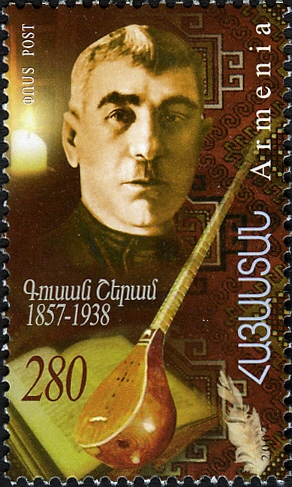Զաւէն Պիպեռեան: ԸՍԻ-ԸՍԱՒ
Click here for the audio recording read by Nora Baroudjian
Կաղանդ է կ'ըսեն կոր, ըսի,
Ի՞նչ ընեմ, ըսաւ,
Բան մը մ'ըներ, ըսի,
Բան մը չեմ ըներ կոր, ըսաւ,
Ինչո՞ւ չես ըներ կոր, ըսի,
Ինծի՛ ինչ, ըսաւ,
Դուն մարդ չե՞ս, ըսի,
-Չեմ գիտեր, ըսաւ:
Մեզմէ չե՞ս, ըսի,
Ի՞նչ գիտնամ, ըսաւ,
Ի՞նչ գիտես, ըսի,
Ուտել գիտեմ, ըսաւ,
Ի՞նչ կ'ուտես, ըսի,
Ի՞նչ որ գտնամ, ըսաւ,
Ինչո՞ւ կ'ուտես, ըսի,
Ապրելու համար, ըսաւ,
Ինչո՞ւ կ'ապրիս, ըսի,
-Չեմ գիտեր, ըսաւ:
Հարցուր, ըսի,
Որո՞ւ հարցնեմ, ըսաւ,
Խիղճիդ հարցուր, ըսի,
Խի՞ղճը ով է, ըսաւ,
Դո՞ւն ով ես, ըսի,
-Չեմ գիտեր, ըսաւ:
Ծնունդ է կ'ըսեն կոր, ըսի,
Ո՞վ ծներ է, ըսաւ,
Փրկիչը, ըսի,
Ետիգուլէ է, ըսաւ,
Աս ուրիշ փրկիչ է, ըսի,
Չեմ ճանչնար, ըսաւ,
Երջանի՞կ ես, ըսի,
-Չեմ գիտեր, ըսաւ:
Ո՞ւր պիտի երթաս, ըսի,
Ե՞րբ, ըսաւ,
Կաղանդին գիշերը, ըսի,
Ո՞ւր երթամ, ըսաւ,
Ո՞ւր կ'երթաս, ըսի,
Կամուրջին տակ, ըսաւ,
Ի՞նչ ընելու, ըսի,
Քնանալու, ըսաւ,
Ինչո՞ւ կը քնանաս, ըսի,
-Չեմ գիտեր, ըսաւ:
Դրամ ունի՞ս, ըսի,
Չունիմ, ըսաւ,
Ինչո՞ւ չունիս, ըսի,
Չեն տար կոր, ըսաւ,
Աշխատէ, ըսի,
Գործ չկայ, ըսաւ,
Ինչո՞ւ չկայ, ըսի,
-Չեմ գիտեր, ըսաւ:
Ժամ երթանք, ըսի,
Ի՞նչ ընելու, ըսաւ,
Տօն է, ըսի,
Ինծի՞ ինչ, ըսաւ,
Կ'աղօթենք, ըսի,
Ինչո՞ւ աղօթենք, ըսաւ,
-Չեմ գիտեր, ըսի:
Մնաս բարով, ըսաւ,
Երթաս բարով, ըսի,
Օդը աղուոր է, ըսաւ,
Ո՞ւր կը տեսնամ քեզ, ըսի,
Ամէն տեղ, ըսաւ,
Մինչեւ ե՞րբ, ըսի,
Մինչեւ մահ, ըսաւ,
Պիտի մեռնի՞ս, ըսի,
Օր մը, ըսաւ,
Ինչո՞ւ համար, ըսի,
Ե՜ս գիտեմ, ըսաւ:
1945, Պոլիս




